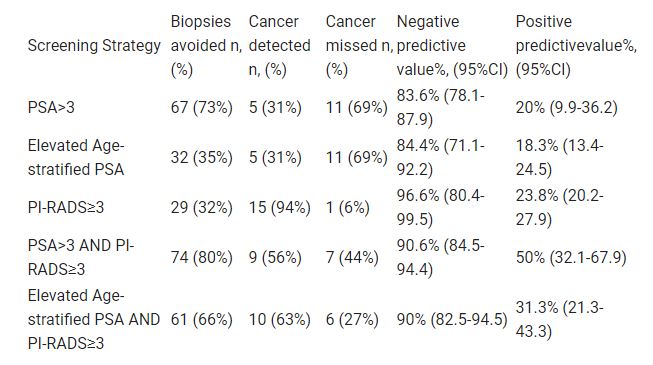Background
Male-carriers of BRCA1/2 gene mutations have an increased risk of prostate cancer (PCa) with a more aggressive phenotype. Current screening guidelines suggest the use of PSA only among BRCA2 carriers. Female carriers have extensive guidelines that include imaging. Our objective was to test the prevalence of PCa among BRCA carriers and examine screening strategies, using PSA and multiparametric magnetic resonance imaging (mpMRI).
Methods
We recruited men aged 40–70 with BRCA1/2 germline mutations and no prior history of prostate biopsy. All men underwent an initial round of screening which included PSA, and prostate mpMRI. PSA was considered elevated using an age stratified threshold of ≥1ng/mL for 40-50Y, ≥2ng/mL for 50-60Y, and 2.5ng/mL for 60-70Y. Men with elevated PSA and/or suspicious lesion on mpMRI were offered a biopsy. PSA levels, MRI findings, PCa incidence, and tumor characteristics were evaluated. Decision curve analysis was used to compare screening strategies.
Results
We recruited 188 men (108 BRCA1, 80 BRCA2), mean age 54Y (±9.8). One hundred and ten (57%) had either elevated age-stratified PSA (75; 40%), a suspicious MRI lesion (67; 36%), or both (32; 17%). Of these, 92 (85%) agreed to agreed to a biopsy. Sixteen (8.5%) were diagnosed with PCa; 44% of tumors were classified as intermediate or high risk. mpMRI based screening missed only one of the cancers (6%), while age stratified PSA would have missed five (31%). Decision curve analysis showed that mpMRI screening regardless of PSA had the highest net benefit for PCa diagnosis, especially among men younger than 55Y. We found no difference in the risk of PCa between BRCA1 and BRCA2 (8.3% vs. 8.7%, p=0.91).
Table: LBA22

Conclusions
PCa is prevalent among BRCA carriers. Age may affect screening strategy for PCa in this population. Young carriers could benefit from initial MRI screening. BRCA carriers older than 55Y should use PSA and referred to mpMRI if elevated.